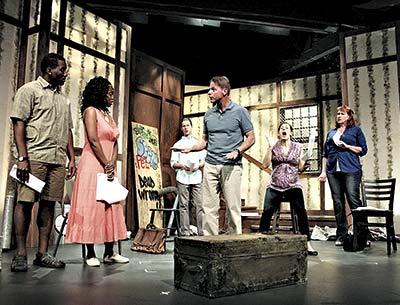There Goes The Neighborhood, Again

Taken by themselves, either act of “Clybourne Park” — the Pulitzer Prize and Tony Award-winning dramedy by Bruce Norris now at the Hampton Theatre Company in Quogue — would stand as a searing yet comedic paean to race relations. Taken together, the two acts masterfully blend into a social commentary on the advancement (or stagnation) of black and white amalgamation over half a century in a desirable Chicago suburb.
Throw in the only white character from Lorraine Hansberry’s “Raisin in the Sun,” the first Broadway play written by an African-American woman, and you have a work of grand historical importance — and a joy to watch as well.
But if you’re expecting a comfortable ride, hang on for dear life. “Clybourne Park” is a series of remarkably awkward moments that show not only how different factions talk about themselves and each other, but also how, as a whole, they appraise the hearing-impaired, the developmentally disabled, sexual identity, men, women, pregnancy, Scandinavians, the “red Chinese,” and chafing dishes. No one emerges unscathed.
Act one takes place in 1959; the second act in 2009, both in the same house, and both with the same actors portraying immensely different roles. The first half deals with the reactions and emotional maelstrom that come when a black family buys a home in a white neighborhood. After the intermission, a lawyered-up African-American couple is trying to retain the historical significance of the house, now in a predominantly black neighborhood, as new buyers want to tear down and upzone — something those on the South Fork may have an inkling about.
The play begins with a middle-age couple, still coping with a recent tragedy, who are packing up after selling their house. Matthew Conlon and Anette Michelle Sanders play Russ and Bev with an engaging realism, whether they are simply making small talk about National Geographic or stirring up old and disturbing memories. Ben Schnickel, as Jim, the local pastor, arrives to chat — Mr. Schnickel is almost Mormonesque in his pallidity. Then Karl Lindner — that overlapping character from “Raisin” — arrives with astonishing news: the new homeowners are “colored” and he has made a counter-offer to keep them out. Joe Pallister is at his best as Karl, a man on fire with his convictions.
During all of this, Francine, the family maid, played with amazing discipline by Juanita Frederick, comes in and out of the room, packing up, asking questions, occasionally being put on the spot for her opinion but mostly ignored. Rounding out the cast are Rebecca Edana as Karl’s deaf and very pregnant wife, and Shonn McCloud, H.T.C. newcomer, who plays Francine’s husband, Albert, with a deadpan attitude in the midst of a lively debate.
Even when trying to understand things from the African-American viewpoint, the Caucasian characters are reprehensibly offensive in what they consider a “progressive” way, talking about soul food as a substitute for soul.
But it is in the second act when the elephant in the room becomes hysterically cringe-worthy. At least in the 1950s race was discussed; as the second act shows, Americans today will talk about virtually anything else, and almost everyone is offended by something. Ms. Edana, hearing-impaired in act one, talks almost non-stop in the second act, a white woman (still pregnant) bent on having the home she wants while trying to appease the locals to a point, as long as that point doesn’t infringe on her two-story dream.
“The history of America is the history of private property,” muses her husband, Steve (Mr. Pallister).
“I rather doubt that your grandparents were sold as private property,” answers Lena (Ms. Frederick), who is labeled a racist by Steve.
Mr. Conlon in the second act plays the only working-class character, the small but important role of Dan, the handyman, an Irish-Catholic holdout in blackburbia who, like Francine in the first act, is basically ignored. So is it color or class?
Hampton Theatre Company’s production of “Clybourne Park” is admirable in every way, from the wonderful ensemble cast, to the set by Peter-Tolin Baker, Sebastian Paczynski’s effective lighting, Teresa LeBrun’s period costumes, and Sarah Hunnewell’s masterful directing of a dialogue-driven vehicle.
When Mr. Conlon’s character drags forth a buried secret at the end that unites the first and second acts, it is neglected by the other characters. Like so many who base their arguments on principle, they are too busy fighting each other to truly see the unabridged past and the scars that a war — whether fought on the battlefield or in the living room — can inflict.
“Clybourne Park” runs at the Quogue Community Hall through March 29, with shows on Thursdays and Fridays at 7 p.m., Saturdays at 8, and Sundays at 2:30.
